Martial law at 40
Martial law at 40
PHILIPPINE MARTIAL LAW REPRESSION REMEMBERED
By Beatrice Paez
TORONTO – Old comrades — an eclectic group of journalists, activists and former political prisoners, shared and relived their experiences under the eye of the state, to commemorate the declaration of martial law forty years ago.
Student clubs, newspapers and forums thought to be hotbeds of dissent were shut down or heavily controlled and surveilled by the government when martial law took effect on September 23, 1972.
Forty years later, though many Filipinos have uprooted their lives and are immersed in new soil, a modest crowd of Filipino expatriates gathered to attend a forum at OISE, organized by a network of Filipino community organizations in memory of those who suffered under the militarized government.
Christopher Sorio, who was tortured in prison, recalled the days on campus when martial law reigned. He remarked that forums like this, back then would have been swarming with state security agents, patrolling the activities of its attendants. “As a student, I realized that my situation was not different from the workers who were not allowed to organize,” he said.
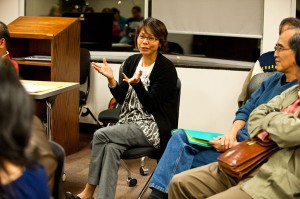
Paulina Joyce Corpuz who was with League of Filipino Students during Martial Law, expressed the need to repeal remnant martial law decrees and orders in the Philippines.
Joyce Corpuz, who also came out for the event with her husband says there are remnants of martial law that still hang over the country. While people confront and remember the past, and are organizing reunions through Facebook, everyone has settled into their own lives. Many are more focused on economic survival, she noted.
Yet, she adds, there are still battles to be waged when it comes to dealing with the legacy of martial law. “[There are] executive orders that are not being repealed,” she said. One example she noted was the latitude afforded to the government, and by extension its security apparatus to execute extrajudicial killings.
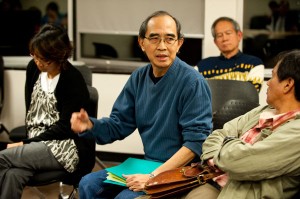
Ricky Esguerra: Hopeful that the tide can be changed if Filipinos abroad stand in solidarity with those back home. Filipino Canadians, he said, can do their part by bringing their concerns to the Canadian government, to draw attention to the destructive effects associated with increased foreign mining activities.
The stories of human rights being trampled by the state that defined the era of martial law continue to make headlines today. “Why do things today seem to be as they were 40 years ago?” Ricky Esguerra, who attended the forum said. “Continuing summary executions, unlawful arrests, torture and detention, desaprecidos, forced mass evacuation of whole communities in the countryside..”
But while violations continue to mount, Esguerra is hopeful that the tide can be changed if Filipinos abroad stand in solidarity with those back home. Filipino Canadians, he said, can do their part by bringing their concerns to the Canadian government, to draw attention to the destructive effects associated with increased foreign mining activities.
The presence of foreign mining companies has been linked to the displacement of communities and the disruption of livelihood, as well as the violation of human rights, meted out by military or security forces hired to protect mining interests.
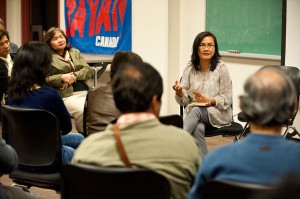
Mila Astorga-Garcia tells the story of how staff of Dumaguete Times were arrested and tortured after they exposed a land-grabbing case involving big landlords.
Though martial law was struck down in 1981, many at the forum noted that parallels in the plight of political prisoners and the scare tactics used persist today. “Media repression continues, and struggles within the media to resist repression continues,” said Mila Astorga-Garcia.
The media has always proven to be the government’s favourite target, in its tenacity to expose the state’s human rights violations. One of the first orders of business under martial law was to wrest control of the media away from its team of journalists and editors, who were among the first to be rounded up and imprisoned.
Signs steering in the direction of martial law were accumulating years before, noted Mila Astorga-Garcia, a journalist and ex-political prisoner, who was vocal in documenting the government’s human rights abuses.
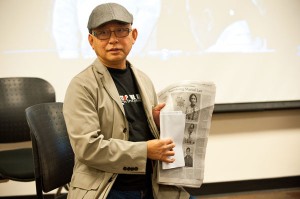
Hermie Garcia: “Wherever you are, even in prison, you can fight and triumph over oppression.” He tells the story of the two-week hunger strike of 140 political prisoners in Bicutan in 1976 under martial law and who won all their demands from the military .
Along with her husband, Hermie Garcia, she and the other staffers at their student-run newspaper, Dumaguete Times, were locked away in 1969, three years before martial law. They were slapped with criminal charges, tied to a double murder in another province.
Having only published five issues, Garcia believes their paper was on the government’s radar for having written about a land-grabbing case in Negros Oriental and stories about exploitation of sugar workers. She and her colleagues were separated and subjected to torture, as a way to turn them against one another; hers took the form of sleep deprivation. “I realized later how much it could destroy a person’s perspective, how much it could destroy a person’s well-being, even one’s health.”
This old formula of linking government critics to common crimes continues to operate as a state tactic under current President Benigno Aquino’s regime, according to the members of Morong 43, a group of health workers and by default, today’s batch of human rights activists that were detained for their work in delivering health services to the poor.
Hermie Garcia, who was arrested again in 1974 during martial law, narrated the story of the two-week hunger strike of 140 political detainees in Bicutan camp in 1976 which successfully demanded the release of two nursing mother detainees and their babies and the improvement of detention food and visiting rights. He said dozens of them collapsed and were brought to the military medical facilities and due to their determination and outside and international support, the military and the defense ministry were pressured to give in to their demands.
He emphasized that wherever people are, even in prison, they can fight for their rights and oppose oppression.
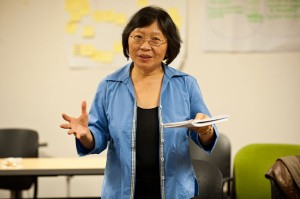
Rev. Irene Ty of United Church of Canada shared her experience with minorities and political prisoners in the Philippines. She saw the ground swallowed by the earth due to underground mining.
Rev. Irene Ty, a Filipino-Chinese minister at Northminster United Church, United Church of Canada, was also in attendance, to speak about her recent trip to the Philippines. Her tour included a trip to Bakayan, organized by the Cordillera People’s Alliance, where community members showed her two sites where the ground has been swallowed by the earth because of underground mining. She also visited the Muntinlupa Bilibid prison, a medium-security prison, where she met with political prisoners. “They were charged with crimes they didn’t commit, car robberies and murders.”
Just as today’s activists are responding to the injustices witnessed, martial law triggered its own awakening among budding student activists. Ben Corpuz, a student part of the martial law resistance movement, says he used his post as chairman of his university’s student council to mobilize his peers.
Eric Baculinao, another student activist, was forced to watch martial law unfold from his perch in Beijing. His three-week tour of the country turned into permanent settlement, to return home after martial law was declared would have resulted in his arrest.
Baculinao contributed his own perspective of what it takes to mount a formidable threat against a repressive state, drawing on what he learned from his experience living in China. He closed the discussion, pitching in his two cents, and said, “Strategic opportunities are not easily created, but they come about and we should be alert to seizing them,” said Baculinao.
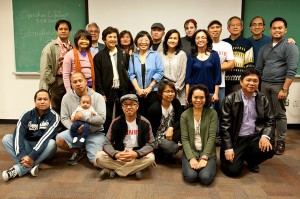
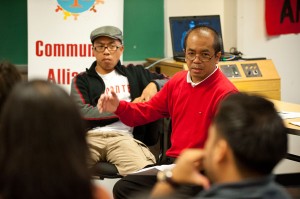
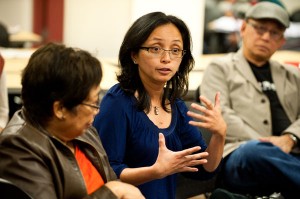
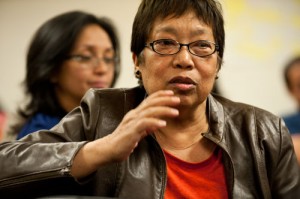
Comments (0)